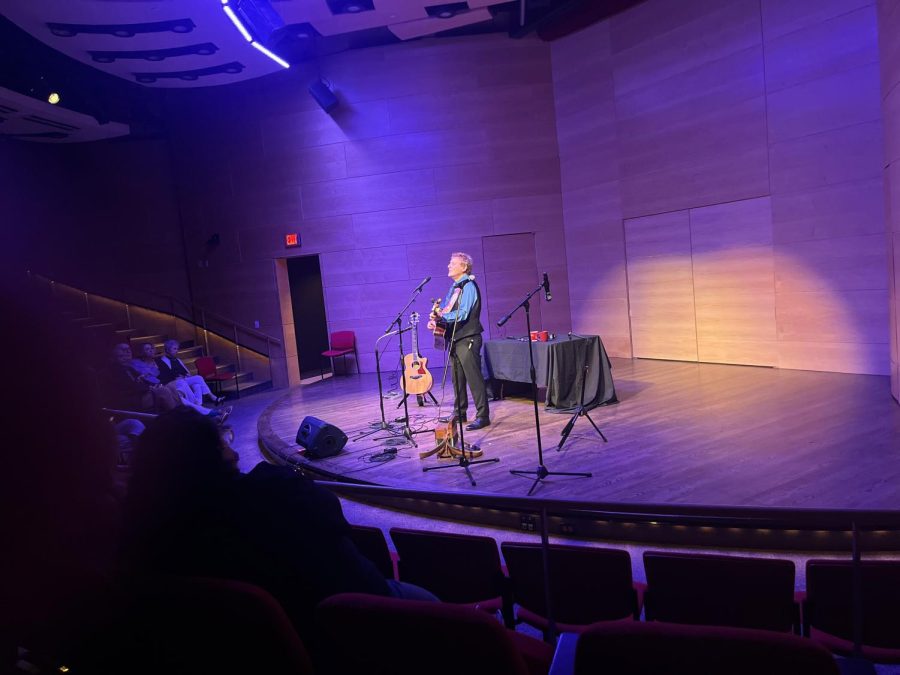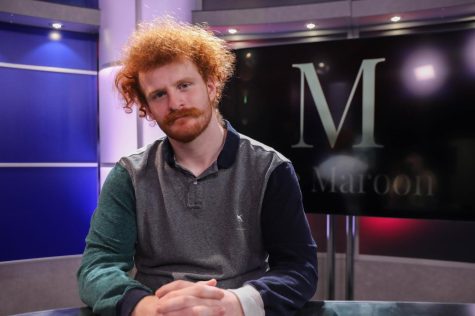Irish musician holds benefit concert at Loyola
Danny O’Flaherty chats with the crowd during his March 11 performance on Loyola’s campus. A portion of proceeds from O’Flaherty’s show went to benefit Loyola’s Institute for Ministry’s scholarship fund. Brendan Heffernan/The Maroon
March 18, 2023
Musician Danny O’Flaherty built a shrine to Irish music and culture with O’Flaherty’s Irish Channel Pub, a French Quarter bar he operated for 16 years alongside his brother, Patrick.
While the pub never reopened after Hurricane Katrina, O’Flaherty revived its spirit last week with a benefit concert held on Loyola’s campus.
“We’re in the ballad room, folks,” O’Flaherty said at the start of his March 11 performance in Loyola’s Nunemaker Auditorium.
The concert was a major hit with students like music education junior Amy Donald. Donald said she’s passionate about her Irish heritage and Irish music. Donald even said she aspires to learn to sing in Irish, as O’Flaherty often does.
“Music like this makes me feel like I have a culture,” Donald said.
The concert, like O’Flaherty’s previous on-campus performances, raised money to fund scholarships for graduate students enrolled in Loyola’s Institute for Ministry.
“Part of the proceeds are going toward scholarships for students who are in ministry, working in churches, making very little money and trying to advance their education,” said Tracey Lamont, the concert’s organizer and the Institute for Ministry’s interim director. “It’s a huge gift that he would do this for us.”
The musician’s friendship with Loyola’s Institute for Ministry began in the glow of one of O’Flaherty’s shining brass taps, as longtime Institute for Ministry professors Barbara Fleischer and the late Rev. Gerald Fagin accompanied many of their students on visits to the bar during its years of operation, Lamont said.
“I asked (Fleischer) how we knew him and they said ‘oh, we know him from the pub,’” Lamont said. “That’s the best answer I could’ve heard.”
O’Flaherty, who grew up in the Connemara region of Ireland located on the island’s west coast, said he was first booked to perform in the French Quarter in 1985 while New Orleans was hosting the World’s Fair. In the midst of the crowds, O’Flaherty and his brother managed to find an audience willing to stay quiet enough to listen to their ballads.
“We were on Bourbon Street singing folk songs, straight forward folk songs, and we were packing the house,” O’Flaherty said. “When it came to the ballads we would close the doors. Bourbon street was full of barkers yelling, ‘two beers for a dollar’ trying to get people into their establishments. But we were doing the opposite. It was mystifying.”
From then on the O’Flaherty’s knew that New Orleans was a special town. By 1989, the brothers had stopped touring in order to open up their own French Quarter pub. They also helped found Louisiana’s Celtic Nations Heritage Festival.
O’Flaherty’s Irish Channel Pub hosted celebrations of Celtic languages, song, dance, and literary traditions while providing a space for community members to enjoy creamy pints of Guinness and hearty conversation. The pub even held concerts featuring legendary Celtic folk musicians like Tommy Makem of The Clancy Brothers, but all of that was in service of a greater mission, O’Flaherty said.
“We gave honor to the people who came before us because so many of us sacrificed their lives for our identity. So many were sent to the gallows just for speaking the Irish language, for singing our songs,” O’Flaherty said. “We wanted to show people that they didn’t have to water down their own cultures either.”
O’Flaherty still regularly performs in Louisiana, and his original music has taken a special interest in connecting the histories and traditions of his home country with those of Louisiana. The musical connections between Louisiana and Ireland that O’Flaherty has spent the last three decades exploring run deep, according to Adrian Scahill, an Irish music historian and lecturer at Maynooth University of Ireland.
Combinations of Irish traditional music and New Orleans jazz became popular among Irish Americans around the turn of the 20th century. These new styles made their way to Ireland and changed how Irish musicians performed traditional music, Scahill said.
“Jazz impacted on the tradition in a number of ways, and in a number of places,” Scahill said. “As in the USA, there was some use of saxophone, drums, and bass which began to creep into the ceili bands, but it was gradual and not used by every band. The drums got incorporated relatively quickly – this was something which definitely came from early jazz bands.”
O’Flaherty’s work honoring these connections included him writing a song about Irish migrant workers who died enduring brutal working conditions while building railroads and canals in the Mississippi River corridor during Louisiana’s antebellum period.
While the legacy of these early Irish Louisianians is complicated by how some in the community worked to uphold white supremacist systems during slavery and reconstruction, O’Flaherty believes educating people about the exploitation the period’s Irish migrants faced both in Louisiana and overseas under British colonial rule is valuable to the mission of intercommunity solidarity today.
“There’s good and there’s bad and there’s ugly. You teach the bad so that people know not to do something like that again,” O’Flaherty said. “If we knew more about who we are, where we came from, how we migrated, we wouldn’t be so quick to make comments about migration and immigration, because all of us are travelers.”








